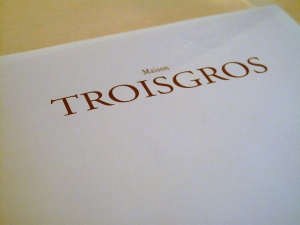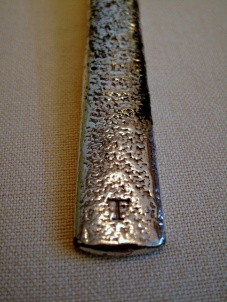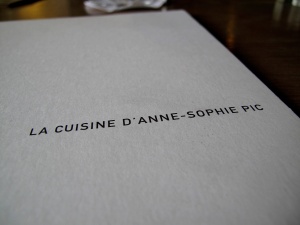Once upon a time, it was the physical geography of a land that dictated the creation of settlements. Supplies of fresh water, flat land for farming, an easily defendable position – these were the factor’s that informed the decisions of early explorers. Examples abound: in England, London(ium) lay upon a busy river-crossing; in Turkey, Byzantium controlled the access to the Black Sea as well as the route between Europe and Asia; in France, Carcassonne sat atop an impregnable hilltop…
Archive for June, 2009
Maison Troisgros, Roanne
Published June 29, 2009 France , Maison Troisgros , Outside Paris , Restaurant Reviews 20 CommentsTags: French Restaurants, Maison Troisgros, Michel Troisgros, Michelin 3*, Restaurant Reviews
Bras II, Laguiole
Published June 28, 2009 Bras (2) , France , Outside Paris , Restaurant Reviews 15 CommentsTags: Bras, French Restaurants, Michel Bras, Michelin 3*, Restaurant Reviews, Sébastien Bras
Perhaps we were just lucky, possibly there had been a cancellation or non-arrival…or maybe it had been the expensive bottle of wine we ordered…whatever the reason, before we had finished our lunch, we were assured that a table would be ready for us at dinner.
Continue reading ‘Bras II, Laguiole’
Bras, Laguiole
Published June 28, 2009 Bras (2) , France , Outside Paris , Restaurant Reviews 11 CommentsTags: Bras (2), French Restaurants, Michel Bras, Michelin 3*, Restaurant Reviews, Sébastien Bras
Bras [se prononce Braz] – in Laguiole [se prononce læ-jol].
Michel Bras always found it too difficult to leave his native land of Aubrac. Born in Gabriac, he attended grammar school in Espalion before moving to Laguiole, where his parents ran a little restaurant – Lou Mazuc. He has remained there or thereabouts ever since.
That might be an understatement. Working away in this ‘isolated desert’ (his words) somewhere in France’s central massif, Michel Bras changed gastronomy. ‘His influence is massive. What he planted seeds for was a culinary revolution,’ asserts David Chang whilst Wiley Dufresne admits, ‘he has been copied by every chef in the world. We’ve all taken a page out of the Bras book – the smear, the spoon drag, putting food on a plate like it fell off a tree.’ Luc Dubanchet, Omnivore’s founder, goes even further: ‘he’s like the godfather of cuisine…the pope. He built his own cuisine…’ To the avante-garde chefs of Spain, he is certainly the most, perhaps the only, revered Frenchman. At just twenty-five, he created a dish – le gargouillou – whose repercussions have been as profound as they have profuse. He, with few others, was the vanguard that paved the way for the New Naturals whose influence grows today.
Continue reading ‘Bras, Laguiole’
Maison Pic, Valence
Published June 27, 2009 France , Maison Pic , Outside Paris , Restaurant Reviews 24 CommentsTags: Anne-Sophie Pic, French Restaurants, Maison Pic, Michelin 3*, Restaurant Reviews
In the town of Valence, there was once a famous jurist called Jacques Cujas. He had an even more famous student, François Rabelais, who would go on to become the writer of note and notoriety from the Renaissance. Besides author, editor, friar, doctor, curate and lecturer, he was a lifelong cook and his works are peppered with quaint edible expressions – ‘the appetite grows with eating,’ for example. One little-known fact about Rabelais was that whilst in Rome, as the personal physician to the ambassador to the Vatican, he collected and took back the seeds of plants unfamiliar to the French; he was even responsible for the introduction of Cos lettuce to France, which subsequently took the name Romaine there.
The Valence which Rabelais left behind on his way to Rome lies halfway between fertile Provence, abundant with its rich bounty, and Lyon, widely accredited as France’s culinary capital. Maybe more renowned for its vineyards – Crozes-Hermitage, St Joseph, St Péray, Côte Rôtie, Cornas – the sleepy, Roman town is also home to one of France’s oldest kitchen dynasties – la Famille Pic.
Continue reading ‘Maison Pic, Valence’






















recent comments